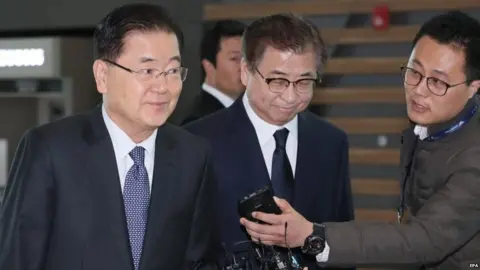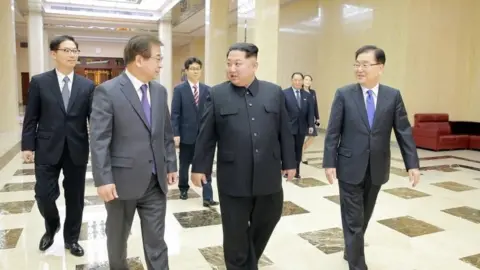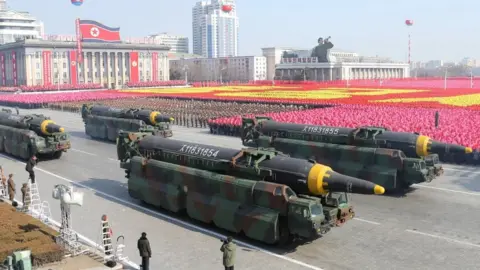North Korea talks: China cautiously 'cheering on' Koreas
 EPA
EPAChina has said it is "cheering on" North and South Korea after they agreed to hold a leaders' summit on reducing tensions on the peninsula.
But foreign ministry officials have cautioned it is too early to assume the talks will bring a lasting breakthrough on the central issue - nuclear weapons.
The two Koreas held a landmark meeting in Pyongyang earlier this week.
The South Korean delegation is now en route to the US, and are expected to pass on a message from Kim Jong-un.
South Korea has said the North has indicated it is prepared to give up its nuclear weapons programme - a defining feature of its politics for decades - if the US agrees to guarantee its security.
"We cannot reveal everything to the media but we do have additional views of North Korea we will relay to the United States when we visit the US," South Korea's head of national security Chung Eui-yong told reporters.
He and Suh Hoon (C), head of the National Intelligence Service, will head to Japan, Russia and China to brief them on the developments.
The US, which only this week increased its sanctions on Pyongyang over the death of Mr Kim's brother Kim jong-nam, has said it is open to talking to North Korea, but only if it commits to denuclearisation.
The past year has seen fierce exchanges of threats between the US and North Korea. North Korea has test-fired increasingly powerful missiles and at one point seemed primed to fire a missile towards the tiny US Pacific territory of Guam.
 EPA
EPABut the Winter Olympics in South Korea provided an unexpected window for diplomacy, with North Korea appearing to be pushing for a de-escalation.
South Korean President Moon Jae-in and Kim Jong-un have now agreed to meet at the border and discuss a halt to the weapons testing.
"We are cheering them on", Chinese foreign ministry spokesman Geng Shuang told reporters on Thursday.
He said China, North Korea's main economic supporter, hoped both sides would seize the change to denuclearise the peninsula while acknowledging each others' "legitimate security concerns".
 EPA
EPAForeign Minister Wang Yi said the summit would be "an important step in the right direction" and called on the US and North Korea to "engage in dialogue sooner rather than later".
However the prime minister of Japan, which saw two North Korean missiles fly over its territory last year, voiced distrust of North Korea's motives.
Shinzo Abe said Pyongyang had used past instances of diplomacy to quietly develop its nuclear capabilities and missiles.
"Talks for the sake of talks are meaningless and we should never loosen sanctions just because North Korea is open to talks," he said.
"North Korea has to show concrete actions toward denuclearisation by committing to abandon its nuclear programme via complete, verifiable and irreversible means."
The last time major international talks were held to persuade North Korea to disarm were the so-called Six Party Talks involving North and South Korea, the US, China Japan, and Russia.
North Korea agreed to shut down its nuclear and weapons programme in exchange for aid and reduced sanctions.
But the talks broke down in 2008, after failing to agree on how to verify the North's commitments, and in 2009 North Korea conducted its second nuclear weapons test.
